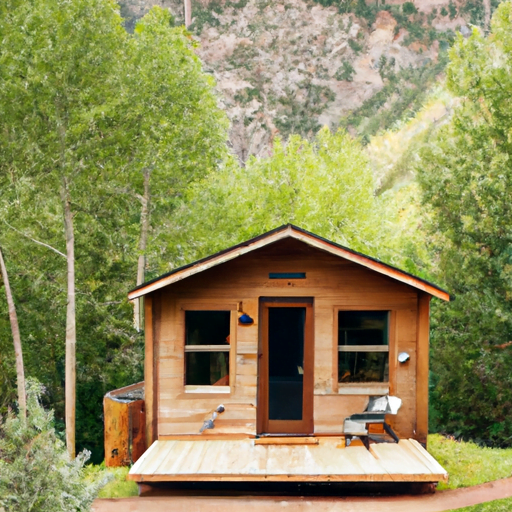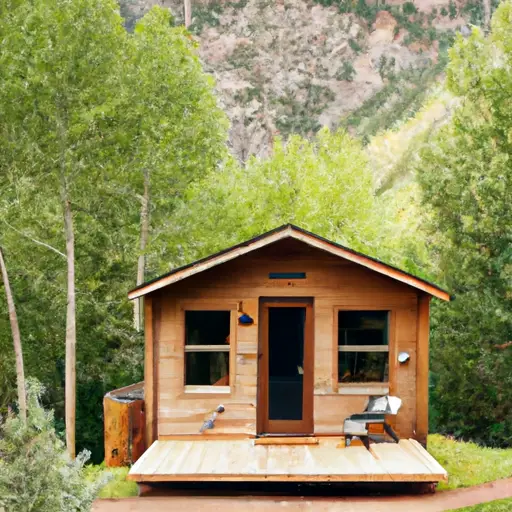Have you ever wondered what it would be like to live a simple life off the grid? You know, no smartphones, no bustling city life, just you and nature. It sounds pretty idyllic, doesn’t it? Well, lucky for you, I’ve got the ultimate guide to living off the grid right here. In this article, we’ll explore all the ins and outs of off grid living, from finding the perfect location to setting up your own sustainable power system. So, if you’re ready to trade in the chaos of modern life for a more grounded and self-sufficient lifestyle, keep reading and get ready to learn everything you need to know.
Living off the grid means disconnecting from the traditional power grid and relying on your own sources of energy. It’s all about embracing a simpler and more sustainable way of living. But how exactly can you do it? Well, there are a few key steps you’ll need to take. First and foremost, you’ll need to find the perfect location for your off grid adventure. It could be a secluded cabin in the mountains, a remote farmhouse, or even a tiny house on wheels. The possibilities are endless, but you’ll want to find a place that meets your needs and aligns with your values. After finding your dream location, the next step is setting up your own power system, like solar or wind energy. This will ensure that you have a reliable source of electricity to power your home.
Living off the grid isn’t just about generating your own power, though. It’s also about embracing a simpler way of life. You’ll need to learn skills like growing your own food, collecting rainwater, and even basic repairs and maintenance. But don’t worry, it’s not as daunting as it sounds. In fact, many off grid dwellers find that this self-sufficiency brings them a sense of purpose and fulfillment that they never experienced in the fast-paced modern world. So, if you’re ready to simplify your life and embrace a more sustainable and connected way of living, stay tuned for our upcoming articles where we’ll dive deeper into the specifics of off grid living. Living off the grid refers to a lifestyle where individuals choose to disconnect from conventional public utilities such as electricity, water supply, and waste management systems. It is about embracing self-sustainability, relying on renewable energy sources, and practicing sustainable living. If you are considering taking the leap into off-grid living, this ultimate guide will provide you with all the information you need to get started and thrive in this alternative way of life.
What is Off-Grid Living?
Off-grid living, in simple terms, is living independently without depending on public utilities. It involves finding alternative methods to meet your energy, water, and waste management needs. Off-grid living offers numerous advantages, including reduced reliance on fossil fuels, a smaller carbon footprint, greater self-sufficiency, and the opportunity to connect with nature on a deeper level.
Getting Started with Off-Grid Living
Choosing the Right Location: The key to a successful off-grid lifestyle is finding the right location. Consider factors such as climate, natural resources, accessibility, and local regulations before settling on a piece of land.
Designing and Building Your Off-Grid Home: Designing an off-grid home involves careful planning to ensure energy efficiency, proper insulation, and sustainable materials. You will also need to consider the layout and orientation of your home to optimize solar gain and natural lighting.
Setting Up Off-Grid Power Systems: Off-grid power systems typically rely on renewable sources such as solar panels, wind turbines, or hydroelectric generators. These systems store energy in batteries for use during periods of low renewable energy production.
Water and Waste Management: Off-grid living requires you to take control of your water supply and waste management. Consider installing rainwater collection systems, composting toilets, and greywater management systems to minimize your impact on the environment.
Sustainable Living Practices
Embracing Renewable Energy Sources: One of the cornerstones of off-grid living is harnessing renewable energy. Make use of solar panels, wind turbines, or micro-hydropower systems to generate electricity and reduce reliance on non-renewable sources.
Reducing Water Consumption: Conserving water is crucial in off-grid living. Implement practices such as low-flow fixtures, rainwater harvesting, and water-efficient appliances to reduce your water consumption and ensure a sustainable water supply.
Implementing Organic Farming Techniques: Growing your own food is a vital aspect of off-grid living. Embrace organic farming techniques such as companion planting, crop rotation, and natural pest control to ensure a bountiful harvest while avoiding the use of harmful chemicals.
Practicing Sustainable Waste Management: Dispose of waste responsibly by composting organic materials and recycling as much as possible. Minimize your use of single-use products and opt for reusable alternatives.
Self-Sufficiency and Homesteading
Growing Your Own Food: Cultivating a home garden allows you to have fresh, organic produce at your fingertips. Learn about permaculture, raised bed gardening, and vertical gardening to maximize your growing space.
Raising Livestock and Poultry: For those seeking a more self-sufficient lifestyle, consider raising livestock and poultry. Chickens, goats, and rabbits can provide you with eggs, milk, meat, and manure for your garden.
Preserving and Storing Food: Preserving excess harvest is essential for long-term self-sufficiency. Learn techniques such as canning, fermenting, dehydrating, and root cellaring to ensure a year-round supply of nutritious food.
Canning and Fermentation Techniques: Canning and fermentation are traditional methods of preserving food. By canning fruits and vegetables or fermenting produce, you can enjoy the taste and nutritional benefits of homegrown food all year round.
Building Resilience and Skills
Learning Essential Survival Skills: Off-grid living often involves facing challenges and unexpected situations. Develop essential survival skills such as first aid, fire-making, navigation, and self-defense to ensure your safety and well-being.
Emergency Preparedness and Disaster Management: Being off the grid requires you to be adequately prepared for emergencies and potential disasters. Have emergency supplies, backup power sources, and a well-thought-out evacuation plan in place.
Developing DIY Skills: Living off the grid often means relying on your own skills and resources. Learn basic DIY skills such as carpentry, plumbing, and electrical work to maintain and repair your off-grid systems.
Homemade Remedies and Natural Healthcare: In remote locations, access to professional medical care may be limited. Learn about natural remedies, herbal medicine, and first aid techniques to take care of minor ailments and injuries.
Maintaining Connectivity in Isolation
Communication Options in Remote Locations: Staying connected with the outside world is essential, even in off-grid living. Explore communication options such as satellite phones, two-way radios, and ham radios for emergencies and staying in touch with loved ones.
Internet and Connectivity Solutions: While living off the grid, you may still need internet access for work, education, or staying connected with the digital world. Explore options such as satellite internet, mobile hotspots, or even community networks.
Transportation and Accessibility: Living off the grid often means being remote and isolated. Plan your transportation needs carefully, considering factors such as fuel efficiency, terrain suitability, and accessibility to essential services.
Creating a Sustainable Lifestyle
Embracing Minimalism and Decluttering: Off-grid living emphasizes simplicity and reducing consumption. Adopt a minimalist mindset and declutter your life, focusing on the essentials and avoiding unnecessary material possessions.
Eco-Friendly Home Design and Decor: Choose sustainable and eco-friendly materials for your off-grid home. Consider repurposing and upcycling furniture and decorations to minimize waste and environmental impact.
Emphasizing Sustainable Fashion and Consumables: Extend your sustainable practices beyond your home. Opt for eco-friendly fashion made from organic and recycled materials. Choose locally sourced, organic, and fair-trade consumables whenever possible.
Challenges and Solutions
Dealing with Extreme Weather Conditions: Living off the grid means being exposed to the elements. Prepare for extreme weather conditions such as storms, heatwaves, or cold spells by having alternative heating and cooling methods in place.
Addressing Potential Health Risks: Off-grid living may expose you to different health risks, such as waterborne illnesses or insect-borne diseases. Maintain good hygiene, practice safe food handling, and invest in proper water filtration systems.
Overcoming Social and Emotional Isolation: Living off the grid often means being distant from neighbors and communities. Combat social and emotional isolation by actively engaging in local community activities, joining homesteading groups, or participating in online forums.
Financial Management Off the Grid
Budgeting for Off-Grid Living: Living off-grid requires careful financial planning. Take into account the initial costs of setting up off-grid systems, ongoing maintenance expenses, and the potential need for backup resources.
Generating Income in Remote Locations: Find ways to generate income while living off the grid. Explore opportunities such as remote work, freelancing, starting a small business, or monetizing your off-grid skills and resources.
Smart Financial Planning: Develop a long-term financial plan to ensure your off-grid lifestyle remains sustainable and financially viable. Consider savings and investments, insurance coverage, and contingency plans.
Conclusion
Living a simple life off the grid can be a rewarding and fulfilling experience. By embracing sustainable practices, honing self-sufficiency skills, and creating a resilient lifestyle, you can thrive in remote locations while minimizing your impact on the environment. Remember, off-grid living is a journey that requires patience, adaptability, and a commitment to simplicity. So, if you are ready to disconnect from the mainstream and embrace a simpler way of life, use this ultimate guide as your roadmap to off-grid living success.





